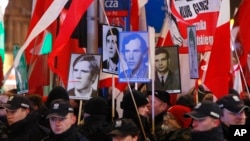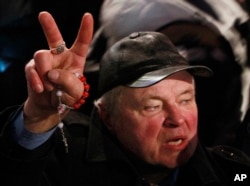Thousands marched across Poland's capital on Tuesday to protest the policies of the current government on the 35th anniversary of the martial law crackdown by the former communist regime.
Protests also took place in other cities, in a show of strength by the opposition after roughly a year in power for the ruling Law and Justice (PiS) party and its leader, Jaroslaw Kaczynski.
The protesters in Warsaw carried Polish and European Union flags, blew trumpets and chanted “Here is Poland” as they banged on drums and marched from the former headquarters of the communist party to the headquarters of PiS.
“Today the authorities attack us, take away our freedoms as 35 years ago,” Mateusz Kijowski, the leader of the Committee for the Defense of Democracy, which organized the protest, told the rally.
The nationalist-minded, eurosceptic PiS has vowed to revamp Poland's young democracy to better reflect traditional Catholic values, curb corruption and increase welfare.
PiS is the first party to hold an absolute majority in Poland's parliament in nearly three decades. As promised, it has implemented generous child benefits, raised the minimum wage and cut the retirement age, solidifying support among its voters.
But PiS also made it more difficult for the top court to pass rulings, a move that deepened divisions in the society and led the European Union to say Poland's democracy and the rule of law were threatened.
PiS lawmakers also backed a bill last month that human rights campaigners have said would undermine Poles' right to freedom of assembly. The senate has since removed some restrictions that would have been imposed by the bill.
And PiS initially backed a near-total ban on abortion, but later threw out the bill after mass protests.
“I am afraid what is going happen tomorrow. I have lost the feeling of stability,” said Anna, 48, a university teacher.
Kaczynski, the leader of PiS, told a counter-rally on Tuesday that people with ties to the previous communist regime were trying to immerse the Polish society in a “haze of complete absurdity” by comparing the “ordering of Poland” by PiS to martial law. “We cannot agree to this,” Kaczynski said.
Kaczynski holds no official government position, but he is widely assumed to be influencing all major policy decisions in EU-member Poland.
Many analysts say Poland's decision to avoid a purge of people associated with the old regime after the end of communism in 1989 has allowed the country to undergo a smooth transition to a market economy and to grow rapidly afterward.
But Kaczynski believes that decision has allowed people associated with the communists to retain power and privileges, preventing a fair distribution of the fruits of economic growth following the transition.
“All that happened during the last 20 years or so was something highly unjust and harmful,” Kaczynski told the counter-rally. “And we want to change it. But this change is meeting resistance, one can say fierce resistance.”
The protest on Tuesday took place on the anniversary of the martial law imposed in 1981 by the communist leader, General Wojciech Jaruzelski. The crackdown was an effort to suppress the Solidarity trade union movement. Hundreds were jailed and dozens were killed.
Solidarity was led by the shipyard electrician Lech Walesa, who was elected president in 1990, after the fall of the Soviet bloc. He appeared on Tuesday at a joint conference on Tuesday with Grzegorz Schetyna, the leader of the opposition Civic Platform party.
“There are more important issues today. One can do this at a different time,” Walesa said. And in an apparent reference to Kaczynski, he said, “But these are people who cannot work creatively and hence have these backward ideas.”






